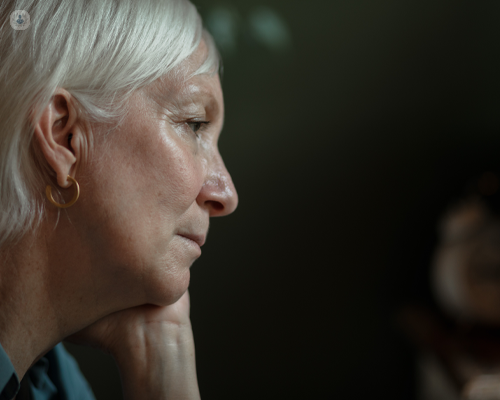Kidney cancer: All you need to know
Written in association with:Leading consultant medical oncologist, and expert in the use of immunotherapy in cancer treatment, Dr Mark Tuthill discusses all you need to know about kidney cancer.
He goes into expert detail about the early signs and symptoms, diagnosis of advanced kidney cancer and treatment for both early-stage and advanced versions of this condition.

What are the early signs and symptoms of kidney cancer?
Kidney cancer usually presents without many symptoms. It's quite often picked up incidentally on other imaging. So, for example somebody has a CT or ultrasound scan for other reasons.
One of the signs of kidney cancer is:
Of kidney cancer that's more advanced, some people will experience:
- weight loss;
- pain in the area where the kidney is.
By in large, that doesn't happen in the era of modern imaging.
How is advanced kidney cancer diagnosed and staged?
When somebody gets diagnosed with kidney cancer on the basis of a scan, we have a look to see if whether that kidney cancer has spread or not around the body. The most common way that spread is identified, is by having a CT scan.
CT scans are able to see kidney cancer, and the most common sites it spreads to are the lungs, and other organs, such as:
- the bones,
- liver, and;
- the lymph nodes.
To confirm that the kidney cancer is there, we often do a biopsy. That's very important to work out they type of kidney cancer you're suffering from.
Kidney cancer comes in different forms. The most common is clear cell kidney cancer, followed by papillary call kidney cancer, and other types as well.
Diagnosis
The way it's diagnosed is first of all, on the appearance on scans, and then in confirmation biopsy test. This is needle-based test which allows us to identify what type of cancer is there.
What are the treatment options available for early-stage kidney cancer?
The most important treatment for early-stage kidney cancer is usually surgery.
However, for smaller lesions, which may have been present for a long time, it's reasonable to observe these, particularly in patients who are older, when it's a certain size.
The tumours which are smaller, which is below four centimetres typically, patients can often undergo ablation as well as considering options like:
- surgery to remove the whole kidney, or;
- a partial nephrectomy to remove half the kidney.
If surgery does take place, and the tumour's thought to at risk of recurrence on the basis of the analysis which has been done at the time of surgery, or after the surgery, then you may be offered some treatment called pembrolizumab to reduce the chance of recurrence after the surgery. The treatment is an immunotherapy-based treatment, which has been shown to reduce the risk of recurrence, and also to improve outcomes for patients who've been diagnosed with early kidney cancer.
How does targeted therapy differ in treating advanced kidney cancer?
There are two different strands of therapies we use to treat kidney cancer. The first is treatments that block the growth of tumour cells. These are tablet-based treatments, which are called tyrosine kinase inhibitors, or TKIs. There are quite a number of these treatments available to use, and these can be used either on their own or combined with immunotherapy.
When somebody is newly diagnosed with advanced kidney cancer, there are a number of different options available. These include:
- tablet treatments on their own, if the cancer, for example, has very favourable characteristics;
- a combination of tablets and immunotherapy, or;
- immunotherapy given with immunotherapy.
Your specialist, when they see you, will make an assessment to decide what treatment will be best for you. This will depend on a number of factors.
Prognosis
First of all, the prognosis of the tumour, so in other words, much more favourable tumours will be typically treated with tablets on their own, or potentially tablets with immunotherapy.
If a tumour has got an intermediate, or poor prognosis, then your specialist will decide with you between having immunotherapy and immunotherapy treatment, for example with IPI (ipilimumab) and nivolumab, or a tablet-based treatment for example; cabozantinib and nivolumab, lenvatinib and pembrolizumab, nivolumab and sunitinib, or pembrolizumab and axitinib.
These treatments will be used to treat the kidney cancer. The tablets have different side effects, and the most common include:
- fatigue;
- diarrhoea;
- sore hands and feet.
The immunotherapy with immunotherapy has immunotherapy-type side effects. They work very well together, but they also work well giving in sequence in other ways as well.
Are there clinical trials offering innovative treatments for both early and advanced kidney cancer?
There are studies which are ongoing, which offer patients innovative treatment for early kidney cancer. So, for example The Wire clinical trial is being set up at Oxford, Cambridge and other centres around the country. This will be looking at whether or not we can give treatment before patients have surgery to remove their kidney cancer. So, we can help to understand their outcomes.
For advanced kidney cancer, there's always studies which are coming and going. If you do want to take part in a study, the most important thing to do is to speak to your local specialist to find out if you have a trial, you can take part in locally. If they don't, you might consider your options for transferring to another centre to take part in the study.
If you require kidney cancer treatment and want to arrange a consultation with Dr Tuthill, you can do so via his Top Doctors profile.


